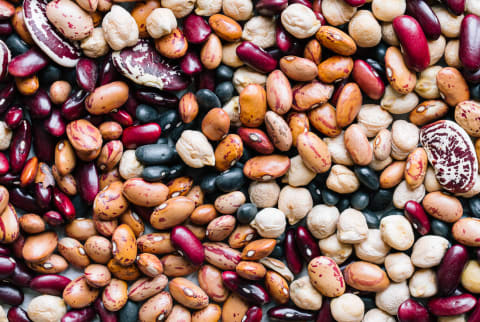Advertisement
The One Ingredient You Should Be Eating Daily For Heart & Gut Health


A cup of beans a day might not sound glamorous, but it could be one of the simplest ways to support long-term metabolic and heart health.
A new randomized controlled trial found that eating just one cup of black beans or chickpeas a day for 12 weeks led to meaningful improvements in cholesterol and inflammation, two key markers of cardiometabolic health. The findings suggest that beans could offer a simple, affordable way to lower the risk of chronic diseases like heart disease and type 2 diabetes.
Beans for the win
The study followed 72 adults with prediabetes over 12 weeks. Participants were randomly assigned to eat one cup of either chickpeas, black beans, or white rice daily. Researchers monitored blood sugar, lipid profiles, and inflammation markers at the start, midpoint, and end of the study.
Here’s what they found:
- Chickpeas lowered cholesterol & inflammation: Total cholesterol levels dropped from ~200 to ~186 mg/dL after 12 weeks, thanks largely to a decrease in LDL cholesterol (“bad cholesterol”). Those consuming chickpeas also saw a decrease in inflammation levels.
- Black beans reduced inflammation: IL-6, a pro-inflammatory cytokine, decreased significantly, from ~2.6 to ~1.9 pg/mL, among black bean eaters, a promising sign for heart and immune health.
Why beans are a metabolic powerhouse
These findings add to the already strong case for beans in a healthy diet. They’re rich in fiber, plant-based protein, and resistant starch (a type of carbohydrate that slows digestion and helps stabilize blood sugar). Plus, their low glycemic index makes them a smart carb choice.
From a heart health perspective, the cholesterol-lowering effects of beans have been supported by previous meta-analyses. The soluble fiber in beans binds to cholesterol in the digestive tract, helping remove it from the body. Plus, compounds like polyphenols and magnesium contribute to vascular health and inflammation control1.
Make beans your go-to
Unlike some “superfoods” that are expensive or hard to find, beans are widely accessible in canned, dried, or frozen form. One cup of cooked beans typically costs less than a dollar, and they’re endlessly versatile in the kitchen.
Here are some delicious and easy recipes to up your intake:
- Up your snack game with these crispy seasoned chickpeas
- These savory chickpea pancakes will keep you full & satisfied
- 4 easy & delicious ways to cook new life into leftover beans
The takeaway
This study adds weight to the idea that small, consistent dietary changes (like eating a cup of beans a day) can deliver big health benefits over time.
Whether your goal is to manage cholesterol, calm inflammation, or simply eat more fiber-rich whole foods, beans deserve a regular place on your plate.